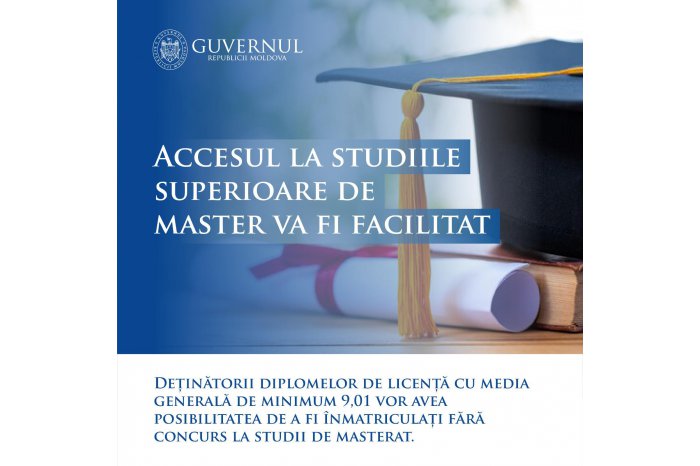Access to master higher education to be facilitated in Moldova
16:42 | 16.02.2022 Category: Official
Chisinau, 16 February /MOLDPRES/ - The holders of degree diplomas with the general average mark of 9.01 will have possibility to be admitted without contest to master education at the universities of Moldova. A provision to this end is contained in the regulation on the organization and carrying out of master higher education – cycle II, approved by the cabinet, the government’s communication and protocol department has reported.
The document establishes the basic requirements for the admission of students and elaboration master’s theses, as well as the general rules for the organization of the day education, extramural education, as well as the distance education.
The regulation sees that citizens of Moldova holding degree higher education diplomas or an equivalent education document can participate in the admission contest in equal conditions. Also, foreign citizens and stateless people will be also admitted, who hold degree higher education diploma based on inter-state agreements, as well as of individual education contracts. The higher education institutions will work out the admission plan for each syllabus of higher master education.
The master higher education syllabus will contain at least 20 per cent courses/modules of specialty different from the other master syllabi from the same field. At the same time, the master courses should not repeat the disciplines studied in the cycle I, degree higher education.
As for the citizens with a full time job, the document establishes general provisions on the master syllabi organized at the extramural education, academic leave, transfer, expulsion and reestablishment to education. Also, in the context of the internationalization of the higher education, detailed provisions are set on the internal and external mobility of the master students.
The master higher education is meant for the graduates of higher education institutions. The new regulation will generate positive effects at the level of labour market, salary payment and possibilities of professional qualification and advancement in career.
Photo: Government

